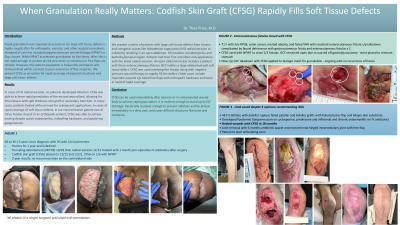Case Series/Study
(CS-119) When Granulation Really Matters: Codfish Skin Graft (CFSG) Rapidly Fills Soft Tissue Defects

Rapid granulation over exposed structures or for large soft tissue defects is highly sought after for orthopedic, vascular, and other surgical procedures. Standard of care has included negative pressure wound therapy (NPWT) or flap closure. While NPWT accelerates granulation by five times, often this is not rapid enough to protect at-risk structures so rotational or free flaps are utilized. However, this patient population is frequently sarcopenic and malnourished which can lead to poor outcomes of flap surgeries. We present CFSG as an option for rapid coverage of exposed structures and large soft tissue defects.
Methods:
We present a series of patients with large soft tissue defects from trauma and iatrogenic causes like hidradenitis suppurativa (HS) radical excision or celiotomy resulting in an open abdomen. HS locations included groins and buttocks/perianal region. Patients had their first and often only application with the initial radical excision. An open abdominal case includes a patient with three enterocutaneous fistulas (ECF) within a large abdominal wall soft tissue defect. CFSG was used overlying the fistulas along with negative pressure wound therapy to rapidly fill the defect. Other cases include traumatic wounds s/p failed free flaps with orthopedic hardware and bone in need of rapid coverage.
Results:
In cases of HS radical excision, no patients developed infection. CFSG was able to achieve rapid granulation of the excised wound bed, allowing for final closure with split thickness skin graft or secondary intention. In many cases, patients healed without need for subsequent applications. In cases of rapid coverage of soft tissue defects, in our representative patient two of three fistulas closed. In an orthopedic patient, CFSG was able to achieve healing despite active osteomyelitis, indwelling hardware, and pyoderma gangrenosum.
Discussion:
CFSG can be used immediately after excision or in contaminated wound beds to achieve rapid granulation. It is resilient enough to stand up to ECF drainage, bacterially resistant enough to prevent infection and be placed immediately in a dirty case, and cover difficult structures like bone and hardware.

.jpeg)